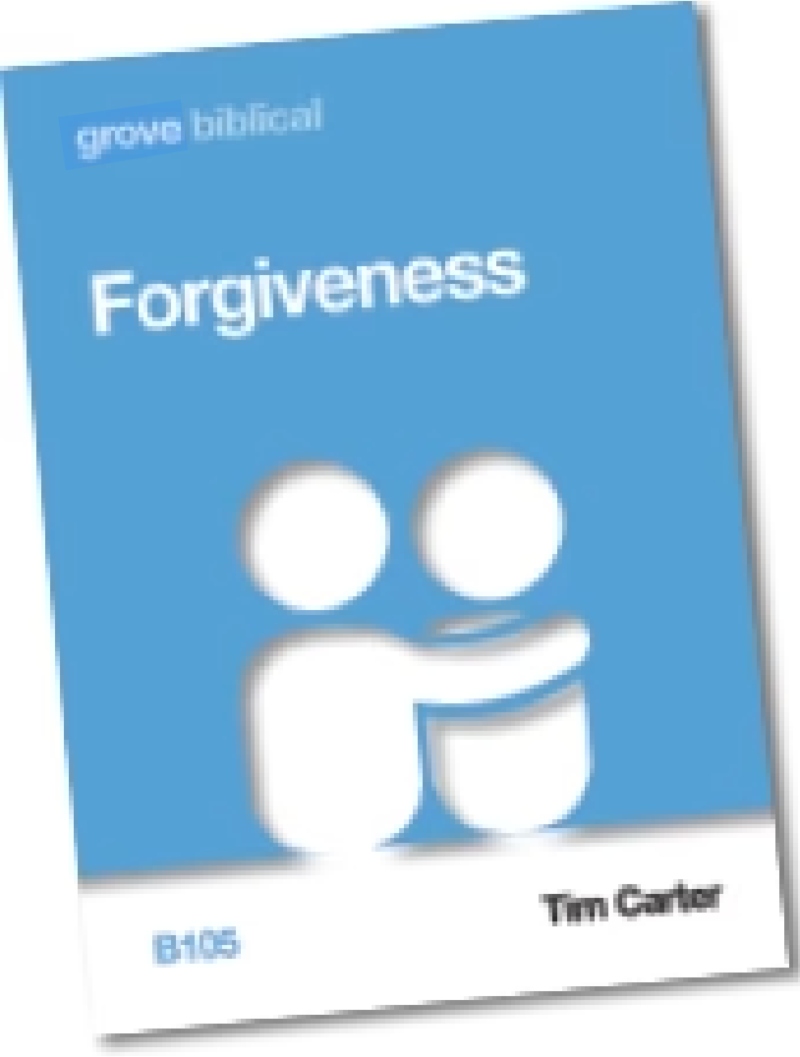Forgiveness, and God's grace
Baptist minister Tim Carter's Grove booklet traces the theme of forgiveness from the Old Testament into the New, through the gospels and Acts and into the letters. It has deepened his understanding of God's grace, he explains

What do you find in this little booklet on forgiveness? Well, it is an important biblical theme, which I have attempted to unpack in this Grove Booklet, which aims to combine biblical study with pastoral concern in an exploration of forgiveness in the Old Testament (OT), forgiveness in the New Testament, and the call to forgive each other.
 Forgiveness clearly matters to God: he reveals himself to Moses as the God who forgives iniquity, transgression and sin, and who visits the iniquity of the fathers on the children to the third and the fourth generation (Exodus 34:7).
Forgiveness clearly matters to God: he reveals himself to Moses as the God who forgives iniquity, transgression and sin, and who visits the iniquity of the fathers on the children to the third and the fourth generation (Exodus 34:7).
In the OT cult, a range of sacrifices is prescribed for the purpose of forgiving people’s sins (Leviticus 4:1-6:7; Numbers 15:22-26), and forgiveness features in numerous OT prayers (1 Kings 8:23-53; 2 Chronicles 6:14-42; Ps. 25, 32, 103, 130; Nehemiah 9:5-38; Daniel 9:4-19), as well as being a crucial petition in the Lord’s Prayer (Matthew 6:9-13; Luke 11;2-4).
Jesus also, disconcertingly, tied our capacity to receive God’s forgiveness to our readiness to forgive others (Matthew 6:14-15; Mark 11:25; Luke 6:37), and Paul picks up on this principle as well (Ephesians 4:31-32; Colossians 3:13).
Jesus’ own readiness to forgive was controversial (Matthew 9:1-8; Mark 2:1-12; Luke 5:17-26; 7:36-50), and he explicitly related forgiveness to his own death (Matthew 26:28) and to Jeremiah’s prophecy of a new covenant, which included the promise of forgiveness (Jeremiah 31:34; Luke 22:20; 1 Corinthians 11:25).
Forgiveness was a key part of the preaching of John the Baptist (Mark 1:4; Luke 3:3) and of the message proclaimed by the church following Jesus’ resurrection (Luke 24:47; Acts 2:38; 5:31; 8:22; 10:43; 13:38; 26:18).
As I journeyed through the Old Testament looking at forgiveness, I found I learned a lot along the way. My eyes were opened to how God wants to dwell ‘in the midst’ of his people, and that is why he set up the sacrificial system, so that he could provide atonement for their sin. I found fresh insight into the literary context of the command to love our neighbour as ourselves, and I think that the narrative of 1 and 2 Kings can help us interpret that difficult passage about God holding subsequent generations responsible for the sins of their parents.
How is forgiveness connected to the death of Jesus? Clearly, from a biblical perspective, there are links to the OT prescriptions for the sin and guilt offerings, but if we rely on the analogy of animal sacrifice to interpret the death of Jesus, then we get bogged down in symbols and concepts that are completely foreign to our culture: for us there is no natural connection between forgiveness and sacrifice, and any claim that God requires bloodshed before he can forgive our sins runs the risk of making him look a bit primitive.
That is where Luke comes in. My interest in forgiveness was initially piqued by the question as to how Luke could talk about forgiveness more than any other gospel writer and yet have what many regard as a weak theology of the atonement. Because Luke was writing for a Gentile audience who would not have been familiar with the OT sacrificial cult, he set out to explore fresh ways of relating God’s forgiveness to Jesus’ death.
Jesus’ prayer on the cross is a key part of that puzzle, which suggests that he was asking his Father to forgive his murderers, despite their lack of remorse for what they were doing. That his prayer was answered is shown by the way in which the message of repentance and forgiveness was subsequently proclaimed in Jesus’ name, in the first place to the people of Jerusalem, the city which had put him to death. Acts makes it clear that the Holy Spirit imparts forgiveness to all who respond in repentance, faith, and baptism in Jesus’ name.
And when I came to the difficult subject of mutual forgiveness, I was challenged to see some of the different levels of forgiveness – letting go of our negative emotional responses when someone injures or offends us, the need to name the offence, the desirability of confronting the offender, the call to release them from the need to make restitution. All this is immensely costly and painful, which is one of the reasons why God’s forgiveness of our sins takes place through Jesus’ suffering on the cross.
Having studied sin for my doctoral dissertation, switching to forgiveness seemed to be a desirable move - with preferable options for gaining practical experience in the subject! Have I been changed through this study? It has helped cement into place a robust understanding of God’s grace towards me: because he has forgiven me, I don’t need to do guilt.
Have I become more forgiving towards others? That is a work in progress, but writing this book has helped me to be honest with myself and that’s a good place to start. I am very much aware that without forgiveness I could end up being quite a nasty person, and the extent to which that is not the case is a measure of God’s grace towards me.
Image | Alex Shute | Unsplash
Tim Carter is the senior pastor of Brighton Road Baptist Church, Horsham
He is the author of the Grove booklet B105 on Forgiveness
Do you have a view? Share your thoughts via our letters' page.
Baptist Times, 23/05/2023